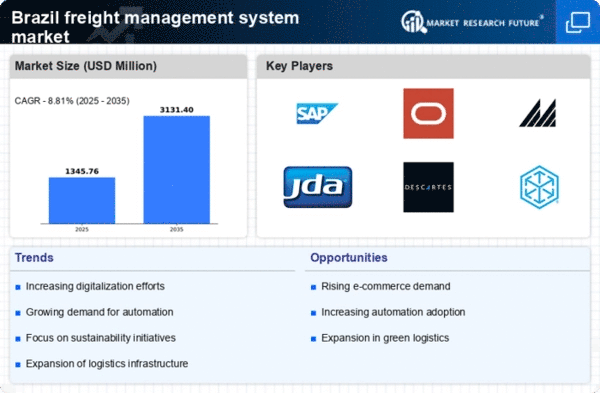Regulatory Compliance and Standards
In Brazil, the freight management-system market is significantly influenced by regulatory compliance and standards. The government has implemented various regulations aimed at improving safety, environmental sustainability, and operational efficiency within the logistics sector. Compliance with these regulations often necessitates the adoption of advanced freight management systems that can ensure adherence to legal requirements. For example, the National Agency of Land Transport (ANTT) mandates specific documentation and tracking for freight operations, which can be efficiently managed through modern systems. As companies strive to meet these standards, the freight management-system market is likely to see increased investment, potentially leading to a market growth rate of 15% annually.
Technological Advancements in Logistics
The freight management-system market in Brazil is experiencing a surge due to rapid technological advancements in logistics. Innovations such as artificial intelligence (AI), machine learning, and the Internet of Things (IoT) are transforming traditional freight operations. These technologies enhance route optimization, reduce operational costs, and improve delivery times. For instance, AI-driven analytics can lead to a 20% reduction in fuel consumption, which is crucial for cost management in the freight management-system market. Furthermore, the integration of IoT devices allows for real-time tracking of shipments, thereby increasing transparency and efficiency. As logistics companies adopt these technologies, the demand for sophisticated freight management systems is likely to grow, indicating a robust future for the market in Brazil.
Increased Focus on Supply Chain Resilience
The freight management-system market in Brazil is witnessing a heightened focus on supply chain resilience. Companies are increasingly aware of the vulnerabilities within their supply chains and are seeking solutions to mitigate risks associated with disruptions. This awareness drives the demand for robust freight management systems that can provide real-time visibility and flexibility in logistics operations. By implementing these systems, businesses can better respond to unforeseen challenges, such as delays or capacity shortages. As a result, the freight management-system market is expected to grow as companies prioritize resilience and adaptability in their logistics strategies.
E-commerce Growth and Demand for Efficiency
The rapid growth of e-commerce in Brazil is a pivotal driver for the freight management-system market. As online shopping continues to expand, logistics companies face increasing pressure to deliver goods quickly and efficiently. This demand for speed and reliability compels businesses to invest in advanced freight management systems that can streamline operations and enhance customer satisfaction. Reports indicate that e-commerce sales in Brazil are projected to reach $30 billion by 2025, further intensifying the need for efficient logistics solutions. Consequently, the freight management-system market is likely to benefit from this trend, as companies seek to optimize their supply chains and improve delivery performance.
Rising Fuel Costs and Operational Efficiency
The freight management-system market in Brazil is also driven by the rising fuel costs that logistics companies face. As fuel prices fluctuate, there is an increasing need for operational efficiency to maintain profitability. Freight management systems that offer features such as route optimization and load planning can significantly reduce fuel consumption and overall operational costs. For instance, companies utilizing these systems may achieve up to a 25% reduction in fuel expenses. This financial incentive encourages logistics providers to adopt advanced freight management solutions, thereby propelling market growth. The focus on cost efficiency is likely to remain a critical factor influencing the freight management-system market in Brazil.
















